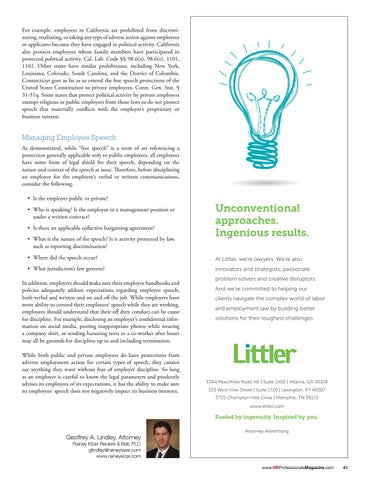For example, employers in California are prohibited from discriminating, retaliating, or taking any type of adverse action against employees or applicants because they have engaged in political activity. California also protects employees whose family members have participated in protected political activity. Cal. Lab. Code §§ 98.6(a), 98.6(e), 1101, 1102. Other states have similar prohibitions, including New York, Louisiana, Colorado, South Carolina, and the District of Columbia. Connecticut goes as far as to extend the free speech protections of the United States Constitution to private employees. Conn. Gen. Stat. § 31-51q. Some states that protect political activity by private employers exempt religious or public employers from those laws or do not protect speech that materially conflicts with the employer’s proprietary or business interest.
Managing Employee Speech As demonstrated, while “free speech” is a term of art referencing a protection generally applicable only to public employees, all employees have some form of legal shield for their speech, depending on the nature and context of the speech at issue. Therefore, before disciplining an employee for the employee’s verbal or written communications, consider the following. • Is the employer public or private? • Who is speaking? Is the employee in a management position or under a written contract? • Is there an applicable collective bargaining agreement? • What is the nature of the speech? Is it activity protected by law, such as reporting discrimination?
Unconventional approaches. Ingenious results.
• Where did the speech occur?
At Littler, we’re lawyers. We’re also
• What jurisdiction’s law governs?
innovators and strategists, passionate
In addition, employers should make sure their employee handbooks and policies adequately address expectations regarding employee speech, both verbal and written and on and off the job. While employers have more ability to control their employees’ speech while they are working, employees should understand that their off duty conduct can be cause for discipline. For example, disclosing an employer’s confidential information on social media, posting inappropriate photos while wearing a company shirt, or sending harassing texts to a co-worker after hours may all be grounds for discipline up to and including termination. While both public and private employees do have protections from adverse employment action for certain types of speech, they cannot say anything they want without fear of employer discipline. So long as an employer is careful to know the legal parameters and prudently advises its employees of its expectations, it has the ability to make sure its employees’ speech does not negatively impact its business interests.
problem solvers and creative disruptors. And we’re committed to helping our clients navigate the complex world of labor and employment law by building better solutions for their toughest challenges.
3344 Peachtree Road NE | Suite 1500 | Atlanta, GA 30326 333 West Vine Street | Suite 1720 | Lexington, KY 40507 3725 Champion Hills Drive | Memphis, TN 38125 www.littler.com
Fueled by ingenuity. Inspired by you. Attorney Advertising
Geoffrey A. Lindley, Attorney Rainey Kizer Reviere & Bell, PLC glindley@raineykizer.com www.raineykizer.com www.HRProfessionalsMagazine.com
41
